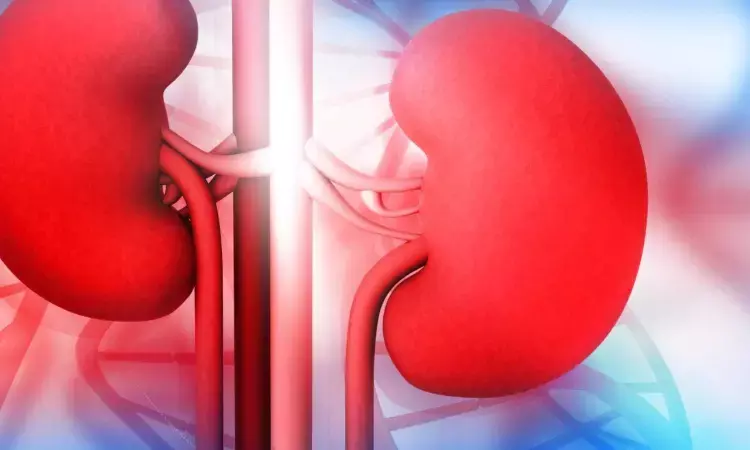- Home
- Medical news & Guidelines
- Anesthesiology
- Cardiology and CTVS
- Critical Care
- Dentistry
- Dermatology
- Diabetes and Endocrinology
- ENT
- Gastroenterology
- Medicine
- Nephrology
- Neurology
- Obstretics-Gynaecology
- Oncology
- Ophthalmology
- Orthopaedics
- Pediatrics-Neonatology
- Psychiatry
- Pulmonology
- Radiology
- Surgery
- Urology
- Laboratory Medicine
- Diet
- Nursing
- Paramedical
- Physiotherapy
- Health news
- Fact Check
- Bone Health Fact Check
- Brain Health Fact Check
- Cancer Related Fact Check
- Child Care Fact Check
- Dental and oral health fact check
- Diabetes and metabolic health fact check
- Diet and Nutrition Fact Check
- Eye and ENT Care Fact Check
- Fitness fact check
- Gut health fact check
- Heart health fact check
- Kidney health fact check
- Medical education fact check
- Men's health fact check
- Respiratory fact check
- Skin and hair care fact check
- Vaccine and Immunization fact check
- Women's health fact check
- AYUSH
- State News
- Andaman and Nicobar Islands
- Andhra Pradesh
- Arunachal Pradesh
- Assam
- Bihar
- Chandigarh
- Chattisgarh
- Dadra and Nagar Haveli
- Daman and Diu
- Delhi
- Goa
- Gujarat
- Haryana
- Himachal Pradesh
- Jammu & Kashmir
- Jharkhand
- Karnataka
- Kerala
- Ladakh
- Lakshadweep
- Madhya Pradesh
- Maharashtra
- Manipur
- Meghalaya
- Mizoram
- Nagaland
- Odisha
- Puducherry
- Punjab
- Rajasthan
- Sikkim
- Tamil Nadu
- Telangana
- Tripura
- Uttar Pradesh
- Uttrakhand
- West Bengal
- Medical Education
- Industry
Empagliflozin reduces risk of disease progression and death in high-risk CKD patients: NEJM

UK: Empagliflozin therapy in patients with chronic kidney disease (CKD) lowers the risk of disease progression or death from cardiovascular causes in patients at high risk, according to findings from the phase III EMPA-KIDNEY trial.
The findings were presented at Kidney Week 2022 and published in the NEJM (New England Journal of Medicine).
Empagliflozin received its first approval from FDA in 2014 for type 2 diabetes. Since then, it is also used for risk reduction of hospitalization for heart failure and cardiovascular death irrespective of ejection fraction.
There is no proper understanding of the effects of empagliflozin in chronic kidney disease patients at risk for disease progression. Therefore, the EMPA-KIDNEY trial was designed to investigate the effects of empagliflozin treatment in a broad range of such patients.
For this purpose, the researchers enrolled CKD patients with an eGFR (estimated glomerular filtration rate) of at least 20 but less than 45 ml per minute per 1.73 m2 of a body-surface area or those having an eGFR of at least 45 but less than 90 ml per minute per 1.73 m2 with a urinary albumin-to-creatinine ratio of at least 200.
Patients were randomly assigned to receive 10 mg once daily of empagliflozin or a matching placebo. The study's primary outcome was a composite of kidney disease progression or death from cardiovascular causes. Progression of kidney disease was defined as end-stage kidney disease, a sustained decrease in eGFR of ≥40% from baseline, a sustained reduction in eGFR to <10 ml per minute per 1.73 m2, or death from renal causes. A total of 6609 patients underwent randomization.
The study led to the following findings:
- Kidney disease progression or death from cardiovascular causes occurred in 13.1% of patients in the empagliflozin group and 16.9% in the placebo group (hazard ratio, 0.72) During a median of 2.0 years of follow-up.
- Results were consistent in diabetes patients or those without diabetes and across subgroups defined per eGFR ranges.
- In the empagliflozin group, the hospitalization rate from any cause was lower versus the placebo group (hazard ratio, 0.86). Still, the researchers found no significant between-group differences concerning the composite outcome of heart failure hospitalization or cardiovascular-related deaths (which occurred in 4.0% of empagliflozin group patients and the placebo group 4.6%) or death from any reason (in 4.5% and 5.1%, respectively).
- The rates of serious adverse events were comparable in the two groups.
"Empagliflozin therapy led to a reduced risk of kidney disease progression or death from cardiovascular causes than placebo in a wide range of patients with CKD who were at risk for disease progression," the researchers concluded.
Reference:
EMPA-KIDNEY Collaborative Group, Herrington WG, Staplin N, Wanner C, Green JB, Hauske SJ, Emberson JR, Preiss D, Judge P, Mayne KJ, Ng SYA, Sammons E, Zhu D, Hill M, Stevens W, Wallendszus K, Brenner S, Cheung AK, Liu ZH, Li J, Hooi LS, Liu W, Kadowaki T, Nangaku M, Levin A, Cherney D, Maggioni AP, Pontremoli R, Deo R, Goto S, Rossello X, Tuttle KR, Steubl D, Petrini M, Massey D, Eilbracht J, Brueckmann M, Landray MJ, Baigent C, Haynes R. Empagliflozin in Patients with Chronic Kidney Disease. N Engl J Med. 2022 Nov 4. doi: 10.1056/NEJMoa2204233. Epub ahead of print. PMID: 36331190.
Dr Kamal Kant Kohli-MBBS, DTCD- a chest specialist with more than 30 years of practice and a flair for writing clinical articles, Dr Kamal Kant Kohli joined Medical Dialogues as a Chief Editor of Medical News. Besides writing articles, as an editor, he proofreads and verifies all the medical content published on Medical Dialogues including those coming from journals, studies,medical conferences,guidelines etc. Email: drkohli@medicaldialogues.in. Contact no. 011-43720751


